|
|
|
Sort Order |
|
|
|
Items / Page
|
|
|
|
|
|
|
| Srl | Item |
| 1 |
ID:
100467
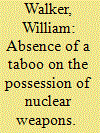

|
|
|
| 2 |
ID:
121096


|
|
|
|
|
| Publication |
2013.
|
| Summary/Abstract |
How strong are normative prohibitions on state behavior? We examine this question by analyzing anti-nuclear norms, sometimes called the "nuclear taboo," using an original survey experiment to evaluate American attitudes regarding nuclear use. We find that the public has only a weak aversion to using nuclear weapons and that this aversion has few characteristics of an "unthinkable" behavior or taboo. Instead, public attitudes about whether to use nuclear weapons are driven largely by consequentialist considerations of military utility. Americans' willingness to use nuclear weapons increases dramatically when nuclear weapons provide advantages over conventional weapons in destroying critical targets. Americans who oppose the use of nuclear weapons seem to do so primarily for fear of setting a negative precedent that could lead to the use of nuclear weapons by other states against the United States or its allies in the future.
|
|
|
|
|
|
|
|
|
|
|
|
|
|
|
|
| 3 |
ID:
100464


|
|
|
| 4 |
ID:
158679


|
|
|
|
|
| Summary/Abstract |
The literature on the India–Pakistan nuclear conundrum has neglected the impact of the international normative environment on India and Pakistan’s nuclear behavior. This article fills that gap, by looking at the impact of the nuclear taboo on Indo-Pakistani strategic interactions during the 1999 Kargil war and the 2002 border standoff. The nuclear taboo, rather than nuclear deterrence, explains the non-use of nuclear weapons. During both crises the nuclear taboo entered the decision-making process instrumentally, in the form of perceived reputational “costs.” The Indian and Pakistani emerging nuclear doctrines endanger a fragile nuclear taboo that would be strengthened by a bilateral non-first use accord. Whether India and Pakistan can move from an instrumental to a substantive acceptance of the nuclear taboo will depend on whether the United States and the other nuclear weapon states, included in the Nonproliferation Treaty, play the role of norm entrepreneurs and strengthen the nuclear taboo at the global level.
|
|
|
|
|
|
|
|
|
|
|
|
|
|
|
|
| 5 |
ID:
189005
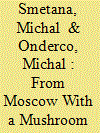

|
|
|
|
|
| Summary/Abstract |
This article presents findings of an original survey experiment on public attitudes toward nuclear use conducted on a representative sample of Russian citizens. We randomly assigned our participants to experimental treatments with vignettes describing a military conflict between Russia and NATO in the Baltics, where Moscow considered a limited nuclear “escalate-to-deescalate” strike to avert defeat. Our findings show that Russians are significantly more averse to nuclear strikes than to the corresponding use of conventional missiles. The participants disapproved similarly of a demonstrative nuclear explosion in an unpopulated area and of nuclear strikes in a more escalated scenario. We also found associations between the moral values of individuals and strike support corresponding to earlier studies in the United States. Finally, our participants reported similar concerns about both nuclear and conventional strikes, with the worry about civilian casualties and the suffering of victims at the top of the list across experimental treatments.
|
|
|
|
|
|
|
|
|
|
|
|
|
|
|
|
| 6 |
ID:
165092


|
|
|
|
|
| Summary/Abstract |
The nuclear weapons taboo is considered one of the strongest norms in international politics. A prohibition against using nuclear weapons has seemingly shaped state behavior for nearly seven decades and, according to some observers, made nuclear use ‘unthinkable’ today or in the future. Although scholars have shown that nuclear aversion has affected decision-making behavior, important questions about the nuclear taboo remain unanswered. This article seeks to answer a basic question: How durable is the taboo? We develop different predictions about norm durability depending on whether the taboo is based primarily on moral logic or strategic logic. We use the comparable case of the norm against strategic bombing in the 20th century to evaluate these hypotheses. The logic and evidence presented in this paper suggest that the norm of nuclear non-use is much more fragile than most analysts understand.
|
|
|
|
|
|
|
|
|
|
|
|
|
|
|
|
| 7 |
ID:
162691


|
|
|
|
|
| Summary/Abstract |
Since August 1945, when the United States dropped two nuclear bombs on Japan in the closing days of WWII, no nation has employed nuclear weapons during war. Many people at the time fully expected that nuclear weapons would be used again after 1945. Yet, neither Presidents Harry Truman nor Dwight Eisenhower used nuclear weapons in the Korean War; Eisenhower refused requests to use nuclear weapons to bail out the French at Dien Bien Phu in 1954; and President John F. Kennedy and Russian Premier Nikita Khrushchev engaged in secret diplomacy to avoid a nuclear catastrophe during the 1962 Cuban Missile Crisis.
|
|
|
|
|
|
|
|
|
|
|
|
|
|
|
|
| 8 |
ID:
100463


|
|
|
| 9 |
ID:
100918


|
|
|
|
|
| Publication |
Cambridge, Cambridge University Press, 2007.
|
| Description |
xiii, 449p.
|
| Series |
Cambridge studies in international relations
|
| Standard Number |
9780521524285
|
|
|
|
|
|
|
|
|
|
|
|
Copies: C:1/I:0,R:0,Q:0
Circulation
| Accession# | Call# | Current Location | Status | Policy | Location |
| 055560 | 355.02170973/TAN 055560 | Main | On Shelf | General | |
|
|
|
|
| 10 |
ID:
192019
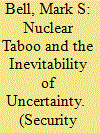

|
|
|
|
|
| Summary/Abstract |
The nuclear taboo—a strong normative inhibition on the use of nuclear weapons—is one of the most important concepts in the study of nuclear weapons.Footnote1 In the last few years, however, the idea of the taboo has come under attack. Notably, a series of studies have shown that mass publics appear quite comfortable with using nuclear weapons.Footnote2 When given hypothetical scenarios in which nuclear use might be considered, publics appear willing to use nuclear weapons, and concerns about (im)morality appear to weigh less heavily than narrow assessments of military utility. In the latest contribution to this research agenda, Janina Dill, Scott D. Sagan, and Benjamin A. Valentino (hereafter DSV) demonstrate that not only Americans appear comfortable with nuclear use.Footnote3 Surveying publics in France, Israel, the United Kingdom, and the United States, they show similar patterns in each country: respondents are surprisingly willing to use nuclear weapons and appear responsive to assessments of military utility. Scholars previously raised the possibility that US publics might be unusual as a caveat qualifying prior findings.Footnote4 DSV’s argument and evidence thus represent an important contribution, showing that prior findings can in fact be replicated across a range of democracies.
|
|
|
|
|
|
|
|
|
|
|
|
|
|
|
|
| 11 |
ID:
189678
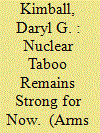

|
|
|
|
|
| Summary/Abstract |
Even before his disastrous decision to invade Ukraine last year, Russian President Vladimir Putin had demonstrated a malign indifference toward basic norms of international behavior, an uneven record of compliance with cornerstone arms control agreements, and a penchant for bullying and using deadly force against opponents.
|
|
|
|
|
|
|
|
|
|
|
|
|
|
|
|
| 12 |
ID:
147323
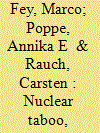

|
|
|
|
|
| Summary/Abstract |
The nuclear age has been characterized by an emerging and now well-established norm of nuclear non-use, the ‘nuclear taboo’. In the realistic and naturalistic setting of the science-fiction TV series Battlestar Galactica, however, nuclear weapons are used frequently and at times massively. Claiming that science fiction can function as an illuminating ‘mirror’ for international relations scholarship and that we can learn something from ‘second-order’ (fictional) worlds, this article explores potential in-show reasons that render the absence of a nuclear taboo plausible within the universe of Battlestar Galactica. We turn to the central pillars of the nuclear taboo in the real world and find them reversed in the show: nuclear weapons are (depicted as) ‘clean’, international institutions are absent, and the enemy is socially constructed as a ‘radical other’, thus rendering the possibility, if not likelihood, of nuclear war plausible. With these insights, we return to our world and argue that, particularly during the years of the George W Bush presidency, the erosion tendencies of the nuclear taboo were indeed quite serious: technological progress and growing political inclination expedited plans to develop usable nuclear weapons, arms control regimes came under considerable strain, and opponents were portrayed as ‘unjust enemies’ or ‘rogues’.
|
|
|
|
|
|
|
|
|
|
|
|
|
|
|
|
| 13 |
ID:
073528


|
|
|
|
|
| Publication |
2006.
|
| Summary/Abstract |
This article analyzes why US leaders did not use nuclear weapons during the Vietnam War. To date, there has been no systematic study of US decision-making on nuclear weapons during this war. This article offers an initial analysis, focusing on the Johnson and Nixon administrations. Although US leaders did not come close to using nuclear weapons in the conflict, nuclear options received more attention than has previously been appreciated. Johnson's advisers raised the issue of nuclear weapons and threats on several occasions, and Henry Kissinger, Nixon's national security adviser, looked into nuclear options to bring the war to an end. Ultimately, however, both administrations privately rejected such options. The conventional explanation for the non-use of nuclear weapons during the Cold War - deterrence - is insufficient to explain the Vietnam case. This article analyzes the role of military, political and normative considerations in restraining US use of nuclear weapons in the Vietnam War. It argues that while military and political considerations, including escalation concerns, are part of the explanation, a taboo against the use of nuclear weapons played a critical role.
|
|
|
|
|
|
|
|
|
|
|
|
|
|
|
|
| 14 |
ID:
187494


|
|
|
|
|
| Summary/Abstract |
According to Nina Tannenwald, the nuclear taboo is a deeply held moral norm against the first use of nuclear weapons. If the nuclear taboo is violated by a country engaging in nuclear first use, how might the taboo be preserved and nuclear restraint restored? An analysis contrasting the logic of nuclear deterrence with the logic of the nuclear taboo offers reasons why the nuclear taboo cannot be preserved if the response to nuclear first use is nuclear reprisal. Instead, the preservation of the nuclear taboo would require a combination of diplomatic, economic, and conventional military responses. Nuclear reprisal might restore nuclear deterrence, but it would also validate the role of nuclear weapons in national or alliance security policy. Taboo enforcement cannot rely on the very behaviors the taboo prohibits.
|
|
|
|
|
|
|
|
|
|
|
|
|
|
|
|
| 15 |
ID:
153631


|
|
|
|
|
| Summary/Abstract |
Numerous polls demonstrate that U.S. public approval of President Harry Truman's decision to drop the atomic bombs on Hiroshima and Nagasaki has declined significantly since 1945. Many scholars and political figures argue that this decline constitutes compelling evidence of the emergence of a “nuclear taboo” or that the principle of noncombatant immunity has become a deeply held norm. An original survey experiment, recreating the situation that the United States faced in 1945 using a hypothetical U.S. war with Iran today, provides little support for the nuclear taboo thesis. In addition, it suggests that the U.S. public's support for the principle of noncombatant immunity is shallow and easily overcome by the pressures of war. When considering the use of nuclear weapons, the majority of Americans prioritize protecting U.S. troops and achieving American war aims, even when doing so would result in the deliberate killing of millions of foreign noncombatants. A number of individual-level traits—Republican Party identification, older age, and approval of the death penalty for convicted murderers—significantly increase support for using nuclear weapons against Iran. Women are no less willing (and, in some scenarios, more willing) than men to support nuclear weapons use. These findings highlight the limited extent to which the U.S. public has accepted the principles of just war doctrine and suggest that public opinion is unlikely to be a serious constraint on any president contemplating the use of nuclear weapons in the crucible of war.
|
|
|
|
|
|
|
|
|
|
|
|
|
|
|
|
| 16 |
ID:
062498


|
|
|
| 17 |
ID:
162358


|
|
|
| 18 |
ID:
192021


|
|
|
|
|
| Summary/Abstract |
Janina Dill, Scott Sagan and Benjamin Valentino have demonstrated how calculations over the morality of contending norms may influence public's readiness to use nuclear weapons. I argue that such atomic dispositions are highly contingent on the nature of the adversary. Public may react differently to various nuclear targets because adversaries evoke different levels of retributiveness. When deciding between the lives of fellow citizens and those of foreign noncombatants, a bargain is easier to reach against targets which evoke feelings of hatred and anger due to historical, cultural or domestic political reasons. Using the Indian case, I demonstrate why the variance in the character of the threat is a substantive issue. Specifically, I show why the India-China dyad exhibits a greater degree of normative prohibition compared to the India-Pakistan dyad.
|
|
|
|
|
|
|
|
|
|
|
|
|
|
|
|
|
|
|
|
|